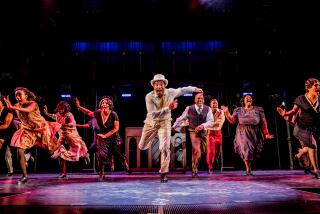THEATER REVIEW : ‘ANIMAL FARM’ : Ever-Valid Fable : In Thousand Oaks, a dramatic adaptation of George Orwell’s classic proves a delight to the ears.
- Share via
This weekend, the Performing Arts Guild in Thousand Oaks concludes an eight-performance run of their reading of Nelson Bond’s dramatic adaptation of George Orwell’s “Animal Farm.” Always worth rereading, the story is a delight to the ears as well.
Set in a time described as “the past; the present; the future,” “Animal Farm” has long been regarded as a classic piece of political allegory. Led by three pigs, the livestock on “Manor Farm” revolt against Farmer Jones, establishing a commune, renamed “Animal Farm,” where the animals work for themselves, and not humankind.
Before long, the societal order promised by the porkers--”Four legs good; two legs bad” and “all animals are created equal”--becomes a memory, as the pigs establish themselves as the new, and no less unsavory, upper class.
By the end of the fable, the members of the porcine upper crust are walking on their two hind legs, wearing Farmer Jones’ old clothes and making covert deals with human businessmen, their former enemies. History is rewritten on the hoof at Animal Farm, and the rules are changed as the game is in motion.
In its simplest reading, the 1945 book is the British author’s commentary on the dangers of a totalitarian government: specifically, the Soviet Union under Stalin. But things aren’t always so simple, and “Animal Farm” is as meaningful in these days of a liberated Eastern Europe as it was nearly a half-century ago. There are also obvious parallels in Western Europe and even in today’s--and yesterday’s, and probably tomorrow’s--North, Central and South America.
Under the direction of John-Michael Duggan, each of the seven players takes on a variety of clearly defined roles, with narration--passed from actor to actor--setting up situations and moving the action forward. Clad in formal black, the actors remain seated for most of the performance, though one or another will stand up or step to the front from time to time.
Accents range from the pure English of Margaret Nesbitt, who plays the pig Napoleon and his (also male) predecessor, to varyingly successful attempts at stage English to straightforward American. The actors’ reading skills vary too, with some having difficulty with the lines at last Friday night’s performance, three nights into the run.
In addition to Nesbitt, the cast consists of Bill Schneider, the effective chief narrator; David Mathews, who plays the idealist, Trotsky-figure pig Snowball; Irv Citron, properly sniveling as Squealer; Ken Johnson as the draft horse Boxer; Barbara Arnello as the vain mare Molly, and Barbara Bellinger as a number of relatively less-significant animals. Lights and sometimes-intrusive but often-effective musical cues are handled by Barbara James.
At last Friday’s show, the audience outnumbered the actors by less than two to one. “Animal Farm” deserves better--one reason that Napoleon and his pigs were able to get the upper hand was the other animals’ brief memory for history.
* The Details: “Animal Farm” can be seen tomorrow and Saturday at 8 p.m. and Sunday at 7 p.m at the Arts Council Center, 482 Greenmeadow Drive in Thousand Oaks. Tickets are $7, $6 for seniors and students. For reservations, which are suggested, or further information, call (805) 499-4355.
More to Read
The biggest entertainment stories
Get our big stories about Hollywood, film, television, music, arts, culture and more right in your inbox as soon as they publish.
You may occasionally receive promotional content from the Los Angeles Times.










